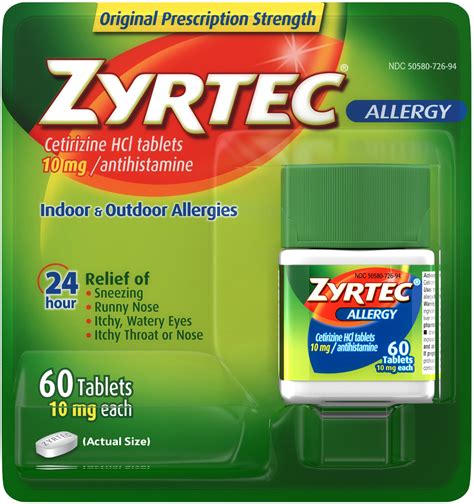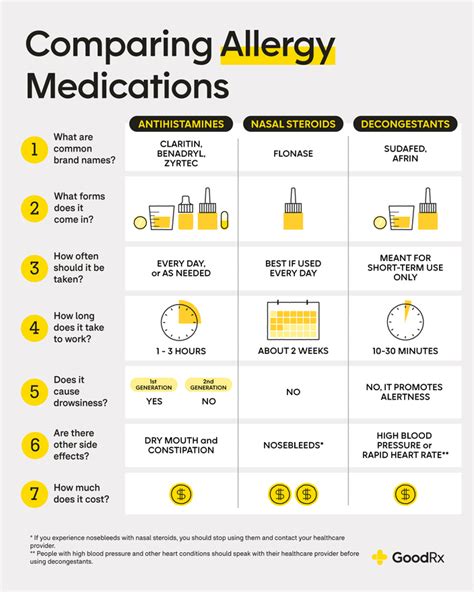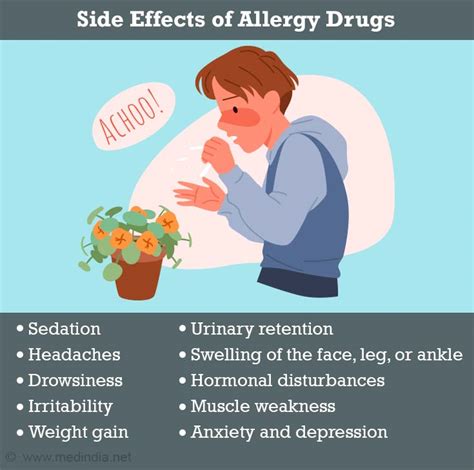Intro
Discover the 5 best allergy meds for relief from sneezing, congestion, and itchy eyes, including antihistamines, decongestants, and corticosteroids for seasonal, food, and skin allergies.
Allergies can be a real nuisance, affecting millions of people worldwide. From mild discomfort to life-threatening reactions, allergies can significantly impact daily life. Fortunately, there are numerous allergy medications available to provide relief. With so many options on the market, it can be overwhelming to choose the best one for your specific needs. In this article, we will delve into the world of allergy meds, exploring the most effective options, their benefits, and how they work.
Allergies occur when the immune system overreacts to a harmless substance, such as pollen, dust, or certain foods. This reaction triggers the release of histamine, a chemical that causes blood vessels to dilate, leading to increased mucus production, itching, and swelling. Allergy medications work by blocking the release of histamine or reducing its effects on the body. With the right medication, individuals can manage their allergies and enjoy a better quality of life.
The importance of finding the right allergy medication cannot be overstated. Not only can it provide relief from uncomfortable symptoms, but it can also prevent more severe reactions. For instance, individuals with severe food allergies must carry an EpiPen, a device that injects epinephrine to counteract anaphylaxis, a life-threatening allergic reaction. By understanding the different types of allergy medications and their mechanisms, individuals can make informed decisions about their treatment.
Understanding Allergy Medications

Allergy medications can be broadly categorized into several types, including antihistamines, decongestants, corticosteroids, and immunomodulators. Antihistamines, such as diphenhydramine (Benadryl), are the most commonly used allergy medications. They work by blocking histamine receptors, reducing the symptoms of allergic reactions. Decongestants, like pseudoephedrine (Sudafed), help relieve nasal congestion by reducing swelling in the nasal passages. Corticosteroids, such as prednisone, are powerful anti-inflammatory medications that can be used to treat severe allergic reactions. Immunomodulators, like omalizumab (Xolair), are used to treat severe allergies by modifying the immune system's response.
Top 5 Allergy Medications

Here are five of the most effective allergy medications on the market:
- Claritin (loratadine): A non-drowsy antihistamine that provides 24-hour relief from allergy symptoms.
- Zyrtec (cetirizine): A fast-acting antihistamine that starts working within an hour and lasts for 24 hours.
- Allegra (fexofenadine): A non-drowsy antihistamine that provides 24-hour relief from allergy symptoms and is available over-the-counter.
- Flonase (fluticasone): A corticosteroid nasal spray that reduces inflammation and congestion in the nasal passages.
- Nasacort (triamcinolone): A corticosteroid nasal spray that provides long-term relief from allergy symptoms and is available over-the-counter.
How to Choose the Best Allergy Medication
When selecting an allergy medication, there are several factors to consider. First, it's essential to identify the type of allergy you have and the severity of your symptoms. If you have mild allergies, an over-the-counter antihistamine may be sufficient. However, if you have severe allergies or experience frequent reactions, you may need a prescription medication. It's also crucial to consider any underlying medical conditions, such as high blood pressure or glaucoma, which may interact with certain allergy medications.Allergy Medication Side Effects

Like any medication, allergy meds can cause side effects. Common side effects of antihistamines include drowsiness, dry mouth, and dizziness. Decongestants can cause insomnia, anxiety, and increased heart rate. Corticosteroids can lead to weight gain, mood changes, and increased blood sugar levels. Immunomodulators can cause injection site reactions, headaches, and fatigue. It's essential to weigh the benefits and risks of each medication and discuss any concerns with your healthcare provider.
Preventing Allergic Reactions
While allergy medications can provide relief from symptoms, prevention is key. Here are some tips to reduce your risk of allergic reactions: * Avoid exposure to allergens: If you're allergic to pollen, stay indoors during peak pollen hours. If you're allergic to dust, use a HEPA air purifier and dust regularly. * Keep a clean environment: Regularly clean and vacuum your home, especially areas where allergens tend to accumulate. * Wear protective gear: Wear a mask when outdoors during peak pollen hours or when engaging in activities that stir up allergens. * Read food labels: If you have a food allergy, always read food labels carefully to avoid accidental exposure.Immunotherapy for Allergies

Immunotherapy, also known as allergy shots, is a long-term treatment that aims to desensitize the body to specific allergens. This treatment involves regular injections of small amounts of the allergen, gradually increasing the dose over time. Immunotherapy can be effective in reducing symptoms and preventing allergic reactions. However, it requires a significant commitment, as treatment can last for several years.
Benefits of Immunotherapy
Immunotherapy offers several benefits, including: * Long-term relief: Immunotherapy can provide long-term relief from allergy symptoms, reducing the need for medication. * Reduced symptoms: Immunotherapy can significantly reduce the severity of allergic reactions. * Improved quality of life: By reducing symptoms and preventing reactions, immunotherapy can improve overall quality of life.Conclusion and Next Steps

In conclusion, allergy medications can provide significant relief from allergy symptoms. By understanding the different types of allergy medications, their benefits, and potential side effects, individuals can make informed decisions about their treatment. Whether you opt for over-the-counter medications or immunotherapy, it's essential to consult with a healthcare provider to determine the best course of treatment for your specific needs. Remember, prevention is key, and by taking steps to reduce your exposure to allergens, you can minimize your risk of allergic reactions.
We invite you to share your experiences with allergy medications and immunotherapy. Have you found a medication that works well for you? Have you undergone immunotherapy? Share your story in the comments below. Don't forget to share this article with friends and family who may be struggling with allergies.
What is the most effective allergy medication?
+The most effective allergy medication depends on the individual and the type of allergy. However, antihistamines like Claritin and Zyrtec are popular choices for relieving allergy symptoms.
Can I take allergy medication with other medications?
+It's essential to consult with your healthcare provider before taking allergy medication with other medications. Some medications, such as blood thinners and certain antidepressants, can interact with allergy medications.
Is immunotherapy effective for all types of allergies?
+Immunotherapy is effective for certain types of allergies, such as hay fever and insect stings. However, it may not be suitable for food allergies or other types of allergies. Consult with your healthcare provider to determine if immunotherapy is right for you.
